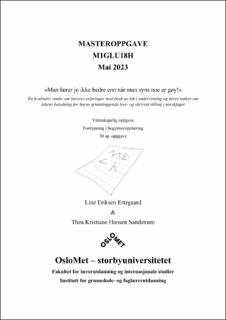| dc.description.abstract | Selv om leken i skolen har fått et økt fokus de siste årene, forsvinner den ofte til fordel for mer stillesittende, lærerstyrt undervisning. Vi har derfor stilt oss spørsmålet om det er rom for leken i skolen i dag, mer spesifikt i norskfaget. På bakgrunn av dette har vi formulert problemstillingen: Hvordan bruker lærere i begynneropplæringen lek for å styrke elevenes grunnleggende lese- og skriveferdigheter? Problemstillingen blir belyst empirisk gjennom kvalitative intervjuer med fem lærere som underviser i norsk på 1. eller 2. trinn, og som bruker lek i lese- og skriveopplæringen. Vi tar utgangspunkt i et sosiokonstruktivistisk vitenskapssyn, og analysestrategien som anvendes er inspirert av Corbin og Strauss (2008) sitt rammeverk som bygger på Grounded Theory. Studiens teoretiske rammeverk presenterer relevante teoretiske perspektiver knyttet både til sentrale sider ved leken og viktige aspekter ved den grunnleggende lese- og skriveopplæringen. Dernest belyses hva som må ligge til grunn for at leken skal integreres i skolens undervisning, og lærerrollens betydning i den sammenheng. I tillegg presenteres et overordnet sosiokulturelt læringssyn, på bakgrunn av koblingen mellom barns språklige utvikling og lek. De mest sentrale funnene i undersøkelsen knytter seg til leken som et komplekst og allsidig fenomen. I samtale med lærerne kommer det frem at de bruker språklek, rollelek og frilek for å styrke elevenes lese- og skriveferdigheter. Det fremmes at leken skaper muligheter for utvikling av muntlige ferdigheter og språklige bevissthet, den gir rom for aktiv og variert undervisning, og derav tilpasset opplæring, som er viktige faktorer for å utvikle gode lese- og skriveferdigheter. I tillegg trer lekens motiverende potensial frem som et sterkt grunngivende aspekt. Lærerne vektlegger også lekens potensial for å skape trygghet og samhold, som er viktig for elevenes trivsel og læring generelt. Gjennomgående i funnene og diskusjonen står lærerrollen frem som betydningsfull for tilrettelegging av og i leken.
In recent years, the discussion about play in schools has received increased focus, especially with the introduction of the new National Curriculum, Læreplanverket for Kunnskapsløftet 2020, which emphasizes the importance of play for the well-being and development of young children. Research also show that the use of play can have a positive impact on students' reading and writing development. However, even though play is formally written into the school curriculum and can be legitimized in many ways, play often disappears in favor of more sedentary, teacher-led learning activities. Therefore, we ask whether there is room for play in schools today, and we want to gain insight into how teachers use play to strengthen students’ basic reading and writing skills. Based on this, we have formulated the following research question: How do teachers in early childhood education use play to strengthen students’ basic reading and writing skills? The research question is answered empirically through qualitative interviews with five teachers who teach Norwegian in 1st or 2nd grade, and who use play in reading and writing instruction. Our approach is grounded in a socioconstructivist scientific perspective, and the analysis strategy used is inspired by Corbin and Strauss’ (2008) framework based on Grounded Theory. The theoretical framework presents key aspects of play and important aspects of basic reading and writing development. In addition, an overarching socio-cultural learning perspective is presented, with emphasis on the connection between children's language development and play. The key aspects of play are elaborated through a multidimensional model that forms a holistic perspective on play: the intrinsic value of play, the utility value of play, and the motivational potential of play. In addition, what must be the basis for integrating play into school education and the importance of the teacher’s role in this context is presented. Important aspects of basic reading and writing instruction include, among other things, reading and writing formulas and key phases in reading and writing development. In addition, important components for developing good reading and writing skills are explained. Finally, play and reading and writing development are connected, and the role of play in reading and writing instruction is presented. In this regard, playful approaches to teaching and literacy-promoting play are explained. The most significant findings in the study highlight play as a complex and versatile phenomenon that is difficult to define and delimit. Nevertheless, the participants value all dimensions of play and consider it positive for the students’ learning. Through the interviews, it becomes apparent that the teachers use language play, role play, and free play as activities that stimulate literacy skills to strengthen the students’ reading and writing skills. Through the analysis, it is evident that play creates opportunities for the development of students’ oral skills and linguistic awareness, and it provides space for active and varied teaching, and thus differentiated instruction, which are all important factors for developing good reading and writing skills. In addition, the potential of motivating students through play emerges as a strong justifying factor, as play creates interest in written language, produces realistic situations, enables students to understand the purpose of writing, and fosters a sense of achievement. The teachers also emphasize the potential of play to create a sense of security and unity, which is essential for the students’ well-being and learning in general. Throughout the findings and discussion, the teacher's role stands out as significant for facilitating play. | en_US |
